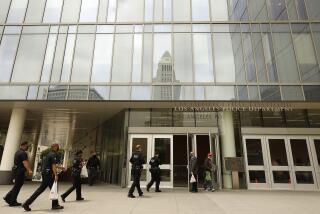Case of N.Y. vs. N.Y. and N.Y.
- Share via
ALBANY, N.Y. — They say all big decisions in this town get made by three men in a room: the governor, Assembly speaker and Senate majority leader.
Perhaps that’s why New York state’s top judge -- fed up with lawmakers’ stalled efforts to increase judicial salaries -- has decided to take aim at the trio and sue them.
In a lawsuit filed Thursday in the state Supreme Court in Manhattan, Judith S. Kaye, chief justice of the state appellate court, argued that the Legislature’s decade-long failure to raise judges’ pay had provoked a constitutional crisis.
“They have undermined a pillar of our form of government,” the suit alleges. “Their constitutional duty is to provide the judiciary with adequate compensation.”
Pay for New York’s 1,250 state-level magistrates ranges from $108,800 for city court judges to Kaye’s top salary of $156,000. New York is ranked 49th among states for judicial compensation, said Kaye’s lawyer, Bernie Nusbaum of Manhattan.
The suit comes after years of governors’ balking at granting legislative raises, which lawmakers consistently have tied to pay raises of judges; both groups last saw an increase in their base pay in 1999.
Despite months of lobbying on Kaye’s part, the budget that legislators approved Wednesday included no increase in judicial salaries.
“I don’t blame them” for suing, Democratic Gov. David A. Paterson said. “I don’t think they’ll win, but I wish them well.” He indicated he thought the issue could be resolved legislatively by the end of the year.
The Republican-led Senate has twice passed legislation granting the raises, but the issue has stalled in the Democratic-led Assembly. “Judges don’t need to sue to get a raise; they need to step up pressure on the state Assembly to act,” Senate Majority Leader Joseph Bruno said.
Assembly Speaker Sheldon Silver predicted that the suit would not have “any impact on judicial raises.”
Silver said money was included in the new budget to pay judicial raises back to Jan. 1. He acknowledged, though, that there had been no agreement on legislation to disburse the money.
Silver spokesman Dan Weiller declined to respond Thursday to Bruno’s allegation that the Assembly was the primary stumbling block. Weiller also wouldn’t comment on the suit’s contention that money was allocated in the 2006-07 budget with no intention of paying it out.
The suit probably will be heard by Justice Edward H. Lehner. Although Lehner could benefit from the case’s outcome, court officials said a state court was the only proper venue to decide a state constitutional issue.
State Atty. Gen. Andrew Cuomo, who normally defends the state and its leaders in lawsuits, refused to take the case, citing the conflicts of interest it poses for his office’s other work.
More to Read
Sign up for Essential California
The most important California stories and recommendations in your inbox every morning.
You may occasionally receive promotional content from the Los Angeles Times.













